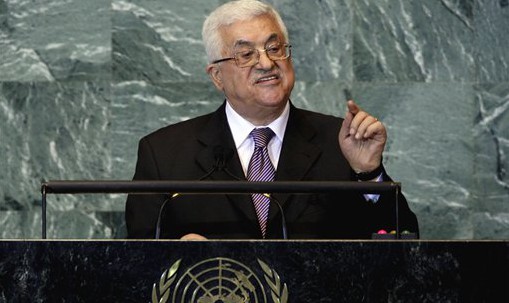

Palestinian President Mahmoud Abbas addresses the 66th session of the United Nations General Assembly, Friday, Sept. 23, 2011. (AP Photo/Richard Drew)
In an impassioned and unapologetic speech that was a direct rebuttal to the efforts of President Barack Obama and Israel to prevent such a move, Palestinian President Mahmoud Abbas told world leaders at the United Nations Friday he had submitted an application for full membership, to be voted on by its Security Council.
The action sets the stage for a showdown with the United States, which has previously stated it would veto the bid.
Abbas’ address, approximately an hour in length and interspersed with pauses filled by loud applause from the delegates of various nations, made a forceful case for the recognition of a Palestinian state in the world body, stressing decades of fruitless negotiations between itself and Israel with the United States working as mediator, impotent treaties and accords and the Israelis’ continued and ongoing settlement of territories it sought to regain.
“This is a copy of the application,” said a smiling Abbas, holding the documents up in the air to resounding applause that included standing ovations from some countries. “Palestine is being reborn.”
For months the Obama administration has been trying to dissuade the Palestinian leadership from making such a submission, instead urging them to return to the negotiating table with Israel and insisting that as the only avenue for lasting peace and full international recognition.
“I am convinced that there is no short cut to the end of a conflict that has endured for decades. Peace will not come through statements and resolutions at the UN,” Obama told world leaders in his address Wednesday. “Peace depends upon compromise among peoples who must live together long after our speeches are over, and our votes have been counted.
“That is the path to a Palestinian state,” he said.
The Palestinian’s submission now pits the United States—one of five permanent members of the United Nations Security Council, of which all must vote in the affirmative in order for the motion to be approved—against what Abbas described as Palestinians’ “inalienable national rights” to exist as an independent state and be recognized as such at the world body. The confrontation is made more awkward given its timing amid the Mideast’s ongoing historic shift toward independence and the embracing of democratic ideals, the so-called Arab Spring.
Now that reckoning—barring an unprecedented change of U.S. foreign policy toward its longstanding ally Israel—is all but inevitable. The U.S. Department of State confirmed earlier this month that should such an application come before the Security Council, the United States would veto it.
Despite its predetermined demise, Abbas pressed forward with the application, characterizing the move not as a thwarting of peaceful resolution to the decades-long Israeli-Palestinian conflict, but part and parcel of a lasting, peaceful solution; evidence, he contended, of its peaceful resolve.
“Our efforts are not aimed at isolating Israel or de-legitimizing it,” he said. “We extend our hands to the Israeli government and the Israeli people for peacemaking. I say to them: Let us urgently build together a future for our children where they can enjoy freedom, security and prosperity. Let us build the bridges of dialogue instead of checkpoints and walls of separation, and build cooperative relations based on parity and equity between two neighboring states—Palestine and Israel—instead of policies of occupation, settlement, war and eliminating the other.
“I do not believe that anyone with a shred of conscience can reject our application,” he added.






